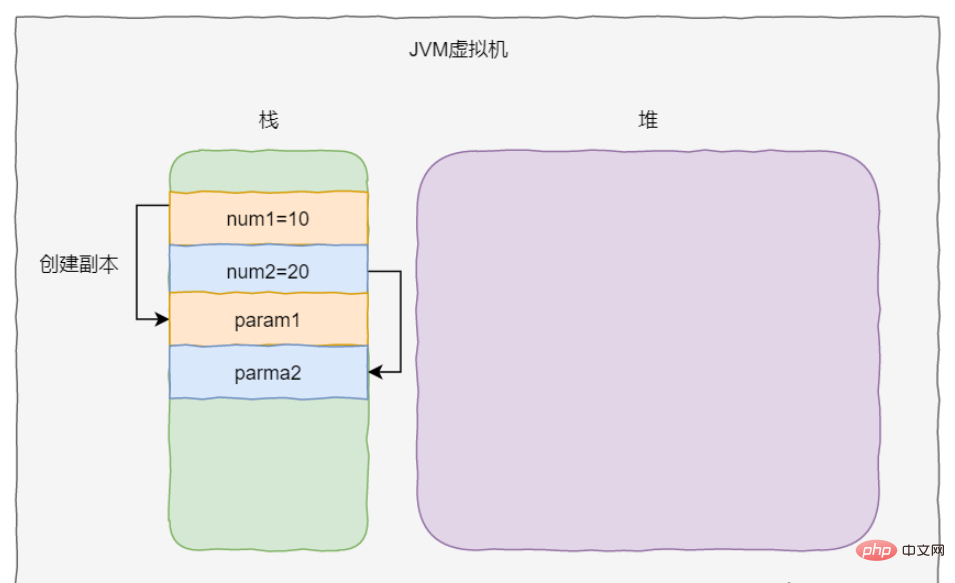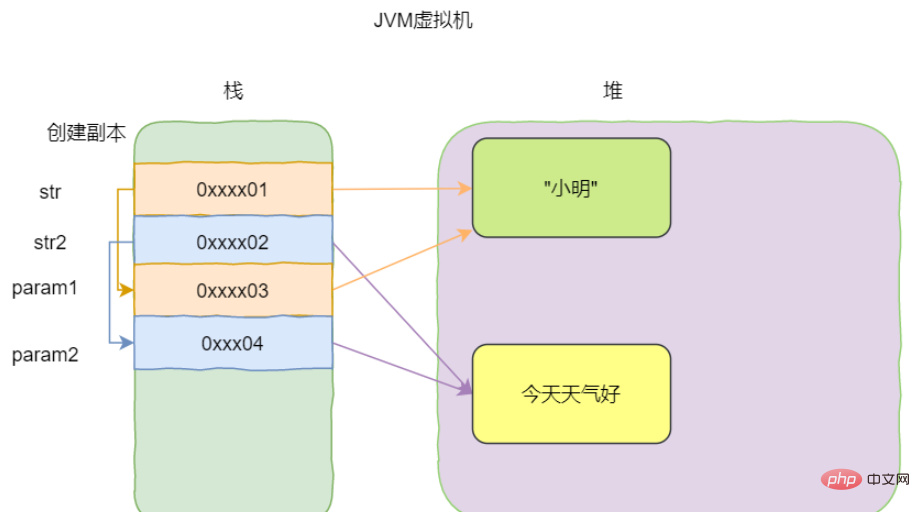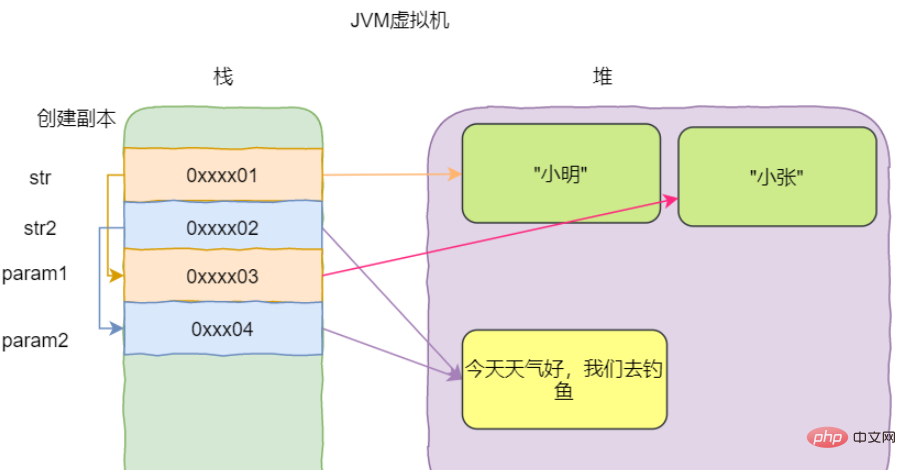Home >Java >javaTutorial >Why is value only passed in Java?
Why is value only passed in Java?
- 王林forward
- 2023-04-18 11:28:02992browse
Classic question
Should Java parameters be passed by value or by reference? This question is very basic, but many people are a little confused
Formal parameters & actual parameters
First we have to understand several concepts about parameters
Formal parameters: The parameters used when defining a function are used to receive the parameters passed in by the function. For example, if we write a function, the parameters in the function are formal parameters.
public void test(String str) { //str为形式参数
System.out.println(str);
}Actual parameters: We call the function When, the parameters in parentheses after the function name are called actual parameters and must have definite values, as shown in the following example
public static void main(String[] args) {
A a = new A();
a.test("小 明"); //"小 明"则为实际参数
}It can be found that when a parameterized function is called, the actual parameters will be passed to Formal parameters.
There are generally two situations for parameters in this kind of passing processValue passing and reference passing.
Value passing: When calling the function, copy the actual parameters and pass them to the function. Modifying the parameters inside the function will not affect the actual parameters. Parameters, that is, creates a copy, which will not affect the native object
- Reference passing: the method receives the address referenced by the actual parameter, and does not create a copy. Modification of parameters will affect the actual parameters, that is,
does not create a copy, but will affect the native object
basic data types and reference data types . Except for 8 basic data types, are all reference data types, namely byte, short ,int,long,char,boolean,float,double
public class TestBasic {
public static void main(String[] args) {
int num1 = 10;
int num2 = 20;
change(num1, num2);
System.out.println("==============");
System.out.println("num1 = " + num1);
System.out.println("num2 = " + num2);
}
public static void change(int param1, int param2) {
System.out.println("param1 = " + param1);
System.out.println("param2 = " + param2);
param1 = 333;
param2 = 444;
System.out.println("after change....");
System.out.println("param1 = " + param1);
System.out.println("param2 = " + param2);
}
}
Result:
param1 = 10We can find that reassigning variables in the change() method does not change the values of variables num1 and num2.param2 = 20
after change....
param1 = 333
param2 = 444
==============
num1 = 10
num2 = 20
What changes is only the copies of num1 and num2 in the change() method. . We need to know that basic data types have only one storage space in memory, which is allocated in the stack.
If the type of Java parameters is a basic data type, it ispassed by value.

public class TestQuote {
public static void main(String[] args) {
String str = "小明";
StringBuilder str2 = new StringBuilder("今天天气好");
change(str,str2);
System.out.println("==============");
System.out.println("str = " + str);
System.out.println("str2 = " + str2);
}
public static void change(String param1,StringBuilder param2) {
System.out.println("param1 = " + param1);
System.out.println("param2 = " + param2);
param1= "小张";
param2.append(",我们去钓鱼");
System.out.println("after change....");
System.out.println("param1 = " + param1);
System.out.println("param2 = " + param2);
}
}
Result:
param1 = Xiao MingWe found that the str variable has not changed, but the str2 variable has changed. Are you confused: if the type of Java parameter passing is a reference data type, it isparam2 = Today The weather is good
after change....
param1 = Xiao Zhang
param2 = The weather is good today, let’s go fishing
str = Xiao Ming
str2 = The weather is good today , let’s go fishing
value passing or passed by reference ?
In fact, everyone has been fooled by a bunch of terminology. The author drew 2 pictures to help everyone understand: before change():

value transfer and will not affect the original object.
Someone may ask again, why does the str variable value not change? In fact, this is entirely due to the special nature of theString class. We know that it is immutable and final. At this time, param1= "Xiao Zhang"; in the function will actually create a new String object implicitly, and at the same time heap A new memory space will be opened in the memory, and param1 points to this newly opened memory space. There is no change in the data in the heap memory space pointed to by the original address str.
The above is the detailed content of Why is value only passed in Java?. For more information, please follow other related articles on the PHP Chinese website!

